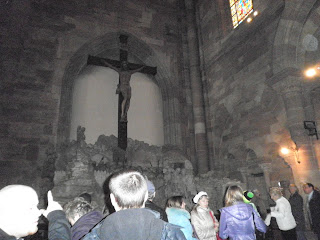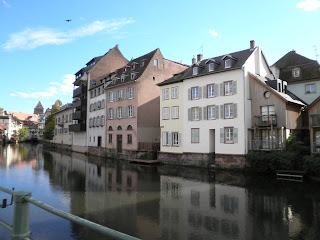Like the first weekend or so after classes started, my friend and I decided to take a trip to Strasbourg. I also speak French, so I was really excited about the opportunity to go to France. The trip was rather spontaneous. It is relatively cheap to get there and only takes about two hours from Heidelberg. We went on a Friday evening and came home Saturday evening. The city is not very big. Upon arriving, we first went to settle in at our hostel. We got dinner at the hostel and then decided to walk around the city by night (after getting a map from the guy at the main desk). The city was beautiful at night and I was rather disappointed that unfortunately my camera does not take night pictures well, so I was going to go back and take pictures during the day. We happened upon a small movie theater where they were showing SKYFALL. It turns out the movie came out in France I believe significantly earlier than it did in the US. All the movies at this theater were dubbed in French with no subtitles, however my friend wanted to see it anyway even though she did not speak any French. We saw the movie; I thought it was pretty good! It turns out it is significantly easier to understand French that is dubbed than French that is naturally spoken in a movie. And now when I think of Daniel Craig, he will always speak French in my mind. My friend was a little bored... . When we left the theater, it was like 1 in the morning and it had started raining a lot. The trams and buses actually stop running very early in Strasbourg, which was rather unfortunate. We were trying to walk back to our hostel (the city is not very big) and got seriously lost. The streets all had signs, but the map we were given only showed large streets. So we knew what large street we were on, just not where or what direction we were going. Every so often, we would find a bus/tram station that had a map and we would temporarily figure out where we were... and then get lost again. And because of the rain, our map had pretty much disintegrated. We finally found a good tram line that we were able to almost follow back to our hostel. We arrived at our hostel soaked at 2:30 in the morning. It was very very annoying to get lost, but I knew nothing too bad would happen. The city is pretty small, so chances were that we would find our hostel just by wandering around randomly. It just could have taken until 6 in the morning. But all turned out ok! Here are some pictures of Strasbourg the next day:
Like Heidelberg, there is a main river that runs through the center of the city.
Thought this was an interesting building. It kind of comes right out at you.
The Cathedral
Inside the Cathedral
They let you climb the spiral staircase all the way to the top of the Cathedral. This is part way up.
These are all the views from all sides of the top of the Cathedral. It was a rather long and exhausting trip up. It kind of gives you the feeling of being claustrophobic, but by that point, the quickest way to get out of the staircase is by continuing to go up.
La Petite France! An old area of Strasbourg.
Swans!!!
Funny looking brown and white swan that I found interesting and had never seen before.
Protestant church
Me with an interesting statue
European Union
My parents also came to visit me in early November. Very nice to have them come visit. I met them in Frankfurt on a Sunday and then we road the train to Zurich and visited with each other while viewing the outside landscape. We got to Zurich in the evening. When we tried to find a place to eat, we discovered that all the restaurants were ridiculously expensive! Actually not just the restaurants, everything was expensive. We managed to find a cheaper Italian place that was 20 Francs for a plate of pasta. 20 Francs is about equal to 20 Dollars. That was the best we could do. The food was very good though! While we were walking around looking for dinner, we encountered a whole bunch of people dressed in costume playing really loud percussion instruments. They had been in the train station as well. There must have been some kind of holiday or festival doing on, but have no idea what it was, even after asking around.
All the festival people came into our restaurant!
Walking around Zurich in the morning.
My parents unfortunately left before Thanksgiving, so I was just here. Thursday night, I went to the Mensa where they were serving chicken. I have never heard of there being any turkey in Germany and I do not know about anyone else who has seen it here either. So, I had chicken and a beer and ended up meeting a friend for dinner. A nice dinner. Afterwards, I was walking around the Christmas Market that had recently begun in Heidelberg and encountered my friend from Scotland and her family. We did some more Christmas Market exploring. The next night, some friends from Spain and Italy decided they wanted to cook a Korean dinner, Bibimbap, which means 'mix of everything.' My Korean friend and I were invited. I considered it another version of Thanksgiving. My Korean friend did as well, since it turns out there is a Korean Thanksgiving, but it was back in September.
Our dinner!!
The next weekend was interesting as well. I met my Korean friend and some German friends for dinner at the Mensa and we then went to go see a popular Korean movie "Pieta." The title is not Korean; I am not specifically sure what it is actually called in Korea, or maybe it is called that. Anyway, the movie was showing in a small movie theater in Heidelberg. It was left in its original Korean, so my Korean friend understood it, and then it had German subtitles, so all my German friends got it easily. I actually got it pretty easily as well with the German subtitles. Surprisingly. It is really strange to listen to a movie in a completely foreign language and then read the movie in another foreign language, my brain goes "wow." It was a very well-done movie about the slums in Seoul. It was actually very unsettling; I do not think I would watch it again.

image from Wikipedia.org
After, we went back to one of my friends' apartment and had sandwiches and Gluwein. Then, another Korean guy, a Peruvian girl, and a Brazilian girl came over. It was crazy! We had conversations going on in German, English, Spanish, Portuguese, and Korean!! It makes your head spin. A very interesting night.











































